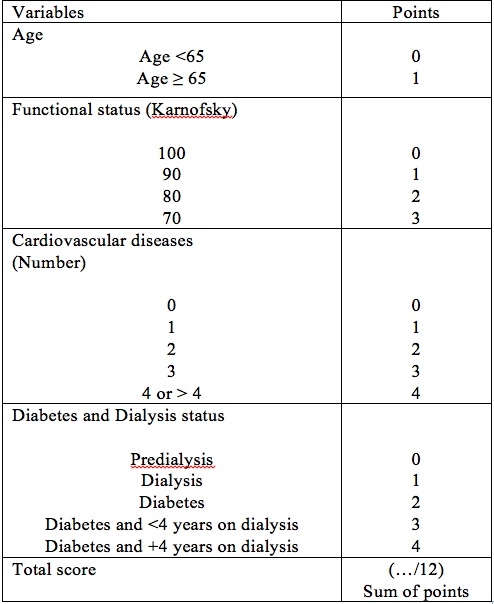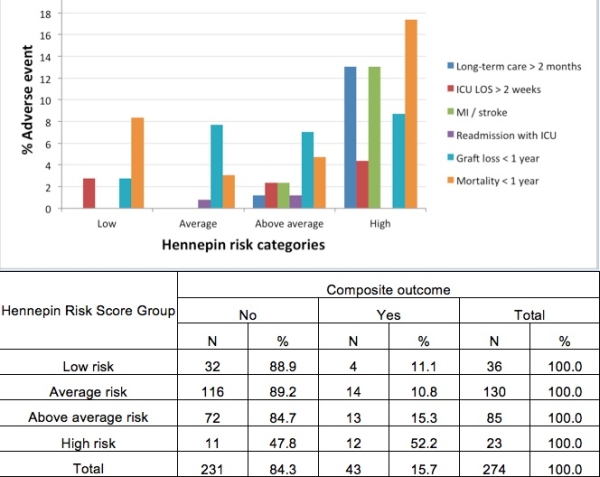External Validation of Hennepin Transplant Risk Score for Prediction of Short-Term Mortality and Morbidity after Deceased Kidney Transplantation
1Transplant Research Center, Brigham and Women's Hospital, Istanbul
2Nephrology, Marmara University, School of Medicine, Istanbul, Turkey
3Nephrology, Kosin University College of Medicine, Busan, Korea.
Meeting: 2018 American Transplant Congress
Abstract number: B108
Keywords: Kidney transplantation, Morbidity, Mortality, Survival
Session Information
Session Name: Poster Session B: Kidney Deceased Donor Allocation
Session Type: Poster Session
Date: Sunday, June 3, 2018
Session Time: 6:00pm-7:00pm
 Presentation Time: 6:00pm-7:00pm
Presentation Time: 6:00pm-7:00pm
Location: Hall 4EF
Introduction: The additive or synergistic effects of multiple co-morbidities at the time of listing on transplant survival is still unclear. Objective scoring systems predicting post-transplant outcomes are needed. We independently tested the applicability of the Hennepin scoring system.
Methods: 274 deceased kidney transplantation recipients (mean age 51.3∓14.9 years, F/M:113/161: 29.3% AA, 26.6% with diabetes) transplanted between 2006-15 were included. Age, functional status, cardiovascular co-morbidities, dialysis and diabetes status, were determined at the time of listing. Serious adverse outcome defined as mortality, graft loss, MI or stroke, ICU stay > 2 weeks/ICU readmission, or care at a long-term care facility >2 months (within 1 year post-transplant). Patients were stratified into 4 risk groups:low (score 0-1),average (2-4),above average (5-7), high (8+). 
Results: A total of 49 events occurred in 43 patients within the 1st year. The incidence of severe adverse events 1-year post-transplant was 17.8 %. While only 8% of patients were stratified into the high-risk group they accounted for 28% of the severe adverse outcomes, a patient in this group having a > 50% chance of a severe adverse outcome. The Hennepin transplant risk score showed moderately good discrimination for severe adverse events (c- statistics:0.648).
The Hennepin transplant risk score showed moderately good discrimination for severe adverse events (c- statistics:0.648).
Discussion: These results provide external validation of the Hennepin score for discriminating short-term post-transplant morbidity for kidney transplantation recipients. Stratifying risk at the time of transplantation will allow for better allocation of deceased organs.
CITATION INFORMATION: Velioglu A., Vijayan M., Shin H., Perry J., Chandraker A. External Validation of Hennepin Transplant Risk Score for Prediction of Short-Term Mortality and Morbidity after Deceased Kidney Transplantation Am J Transplant. 2017;17 (suppl 3).
To cite this abstract in AMA style:
Velioglu A, Vijayan M, Shin H, Perry J, Chandraker A. External Validation of Hennepin Transplant Risk Score for Prediction of Short-Term Mortality and Morbidity after Deceased Kidney Transplantation [abstract]. https://atcmeetingabstracts.com/abstract/external-validation-of-hennepin-transplant-risk-score-for-prediction-of-short-term-mortality-and-morbidity-after-deceased-kidney-transplantation/. Accessed February 20, 2026.« Back to 2018 American Transplant Congress
